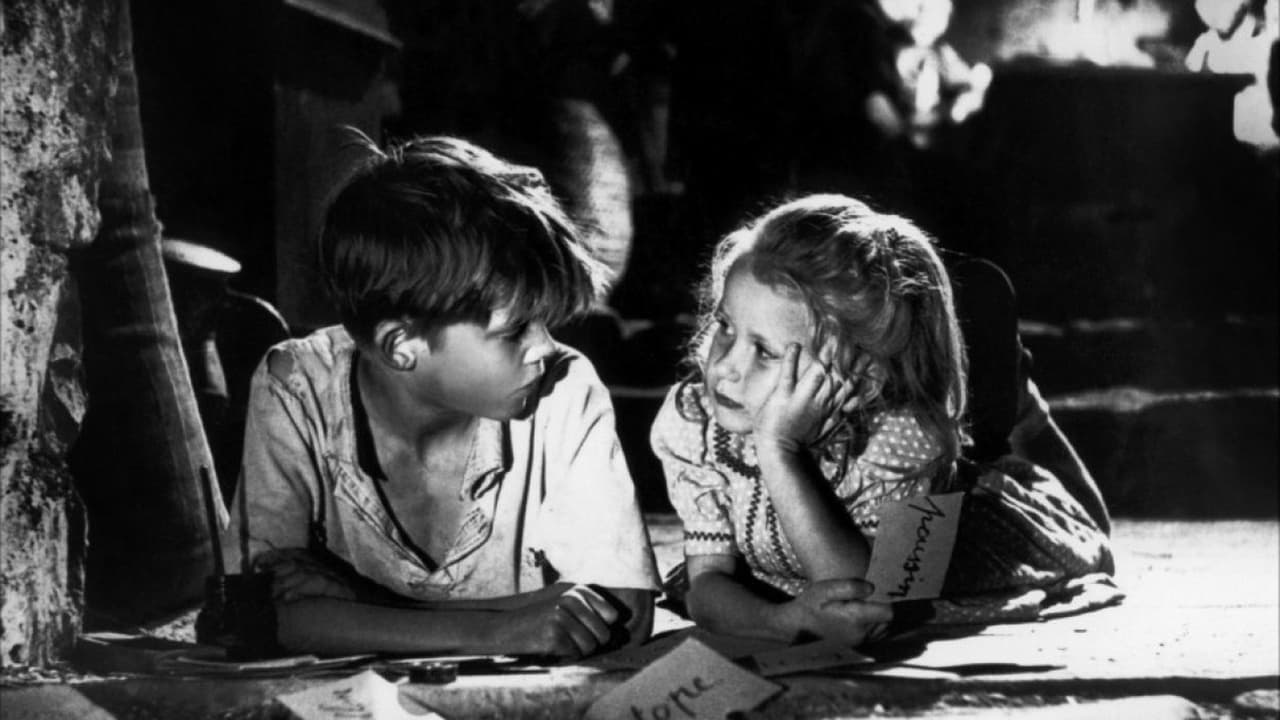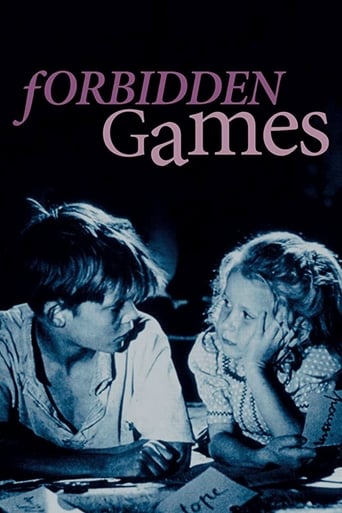

I think this is a new genre that they're all sort of working their way through it and haven't got all the kinks worked out yet but it's a genre that works for me.
... View MoreThis movie is the proof that the world is becoming a sick and dumb place
... View Moreterrible... so disappointed.
... View MoreFanciful, disturbing, and wildly original, it announces the arrival of a fresh, bold voice in American cinema.
... View MoreWith my film viewing having slowed down due to needing to take care of ill family members,I decided to pick things up during the last days of the French challenge on ICM. Finding Purple Noon, The Walls of Malapaga and Les Maudits to be excellent Film Noir's (and also knowing his role behind the classic Beauty and the Beast) I decided that it was time to play games with Rene Clement.The plot:Chasing after her dog during an air raid, Paulette is pushed to the ground by her parents,as a plane starts firing the ground. Getting up,Paulette discovers that along with her pet,mum and dad have also been shot dead. While trying find comfort from her dead pet,Paulette crosses paths with 10 year old Michel Dollé. Finding Paulette all on her own, Dollé gets his family to "unofficially" adopt Paulette.Unable to hold a funeral for her parents,Paulette starts wanting to give her pet a fitting send off,which leads to Dollé playing a forbidden game of stealing crosses for Paulette's animal funerals.View on the film:Not playing games with their impeccable transfer,Studiocanel keep the soundtrack and subtitles crisp and easy to read/listen to,whilst retaining the grain of the image.Expanding on footage shot for an abandoned anthology a year after initial production,co-writer(with Jean Aurenche/Pierre Bost and François Boyer) directing auteur Rene Clement & cinematographer Robert Juillard make the footage blend in seamlessly,with Clement making sure that the fake wigs and teeth hide the growth spurt of the leads. Following the bullets running along the pavement to Paulette's parents,Clement continues expanding on his major visual theme of claustrophobic, confined locations,in the farm of the Dolle's being lined with shadows that Clement enters in stylishly shots allowing the darkness of war to seep into the farm. Staying at the same level as Paulette and Michel,Clement and Juillard give the duo a brisk,crisp appearance which subtly reflects the light they give each other from the darkness of war.Killing Paulette's family within the first 5 minutes (!) the writers make the effect of WWII give the characters a superb, unsettling casual treatment of death,with the lack of awareness the adult Dollé's show towards one of them being on his death bed,matching Paulette showing more interest in her dead pet than her dead parents. Keeping Paulette and Michel's graveyard separate from the adults,the writers brilliantly unearth a satirical cross at the church with the simmering anti-war theme worn with the children performing funeral rituals to deaths that they know nothing of.Encouraged by her parents to take the role,6 year old Brigitte Fossey gives an absolutely incredible performance as Paulette. Heart wrenching continuing to stroke her pet long since taken by the stench of death,Fossey threads Paulette in an innocent (but not naïve) melancholy,lit by Paulette trying to perfect the funeral rituals for her beloved animals-which Paulette is not able to perform for her own family. Just 6 years older than Fossey, Georges Poujouly gives a remarkable,complex performance as Michel. Sharing Paulette's innocence's to death,Poujouly layers Michel with an earthy awareness of the effects that WWII is having on his family,as Michel and Paulette experience the forbidden games of war.
... View MoreHere's another french classic. What we've got here is nothing in the style of French New Wave but this isn't just another Holocaust film either. Even though it takes place at the time of the infamous World War II, at least the filmmakers had the decency of not showing too much of the horrors of the war, which is fine by me. That said, this movie is depressing in nature, but that was inevitable. The journey of a very little child named Paulette is quite heartbreaking. Yet it's not like there isn't some humor in this frenchy classic.Paulette is, along with her parents and her sweet puppy, trying to escape from the horrors of war. So are many people. Not all have the same luck, though. Paulette escapes unharmed but both her parents and her adorable puppy don't make it. The bit of the puppy is the most heart-wrenching part of this motion-picture, not only for this little angel's death but also for Paulette's pain over it and the way it gets thrown from some height.Meanwhile Paulette has the luck of finding a bigger and older boy named Michel. They become good friends almost immediately. Michel is notoriously glad with this new friendship (his face speaks more than words). They build a secret graveyard for animals and Michel takes very good care of Paulette, despite the horrible family he's got.Sadly, Paulette is abruptly taken away from Michel, which is devastating for both kids. The ending is very vague. Just when the movie seems to be at the middle, it suddenly ends and we never know if Michel and Paulette ever see each other again.Brigitte Fossey offers one of the most emotional performances by children actors ever as Paulette. Pretty much the same can be said about Georges Poujouly as Michel Dollé.Title in Portugal: 'Brincadeiras proibidas'.
... View MoreWar. A peasant family. A girl. An animals cemetery. And mixture between innocence and bereavement. A movie as a white paper. Every word is a seed- sign. German plains and secret games. Michel and Paulette. Love as indistinct smoke of autumn and looks of children like huge mirrors. Film about forms of cruelty , it is not pledge against war but sketch for small hours of fundamental peace. Picture of a world , secret, fragile, strong and its borders. Ladder between ages, Jeux interdits is invitation to large view . Crashes, meetings, end of graves and courage to build an unbearable circle. Memories and steps. In the front of dusty words. In the skin of impressive music.
... View MoreA small French girl orphaned by attacking Nazi planes is taken in by a farm family where she and the boy she bonds with establish a hidden animal cemetery. No need to detail the plot since others have already done so. Just a few comments on points generally uncommented on by others. Yes, the movie's main point concerns the invisible scars war leaves on the young. Little Paulette and youthful Michel will likely never recover from their psychic wounds, while the shot of little Paulette wandering helplessly among the chaotic tide of refugees is one of the most quietly searing in film annals. The harm already done her by the Nazis is in fact compounded by the unfeeling way she is disposed of by both the farm family and the orphanage. The film's brilliance lies in making us feel what she feels in a wholly unsentimental way. That, I think, is the basis of the film's near universal appeal. However, there is a second less universal theme overlooked by most. In fact, as many French critics complained at the time, the two farm families really are depicted in unflattering fashion. Some called the portrayal of the Dolle's and Brouard's an unfair and vicious slur on French peasantry. Unfair or not, daddy Dolle comes across as a small-minded tyrant whose chief means of communication with son Michel amounts to a blow to the head, while the final beating in the barn is truly brutal. Then too, he flat out lies to Michel by sending Paulette away, seemingly indifferent to the boy's emotional trauma. And when the easily overlooked younger daughter tries to bring something "beautiful" into her life by reading in a dim light, he sends her to bed with the admonition that "light is not for reading". Also, the older surviving brother has dodged military service by faking an illness, while the Brouard son has deserted the army claiming a lack of leadership. As someone in the film wryly observes: with material like this, no wonder we lost the war. And no wonder some Francophiles complained loudly. There are many other unflattering instances as well, and somehow I get the feeling that this aspect of the script results from an entrenched hostility between city sophisticates and countryside traditionalists. Anyway, it's a testament to the mysteries of human personality that such a profoundly intuitive boy as Michel could emerge from such unpromising family fodder. The other neglected point surrounds the film's often understated humor. Much of it passes quickly and so is easily overlooked. But it's there, particularly with the Brouard boy, and his lusty relationship with the older Dolle girl. He's a faintly comical character to begin with. Our first view of him is of a deserter returning home in baggy uniform, announcing his arrival by standing outside the Brouard hovel and blowing sour notes on a stolen trumpet-- a parody, I guess, of 'The Hero's Return'. The graveyard scene between the feuding families also has a faintly comical undertone. It's not the kind of brawl to take seriously, and when daddy Dolle refuses to reciprocate by helping daddy Brouard out of the coffin hole, a rather humorous point is made about Dolle's selfish character. Anyway, look fast, because there are unexpected deposits of humor in an otherwise very somber story. By and large, anti-war films are not known for their understatement, often relying on one form or another of visual or verbal shouting. 'Games', however remains a masterpiece of unadorned understatement. Except for the rather stagey graveyard scene, it's told in simple and straightforward fashion, allowing audience emotions to build quietly until the final shattering scene. All in all, it's very effective. Of course, everyone wonders what is to become of little Paulette. But the same question could be asked of the disillusioned Michel. For it's clear in his final scene that while throwing away the graveyard crosses, he's casting aside more than mere pieces of wood.
... View More